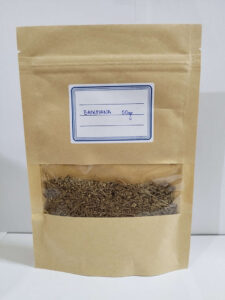What is valerian
Valerian is a plant that is native to Greece but thrives in other countries in Europe, the USA, Canada and Asia. It can grow up to 1.5 metres and its flowers are small in size and white to pink in colour. The root of the valerian is the part of the plant where the ingredients with its medicinal properties are concentrated. As a sedative plant it has been used since ancient times and is still indicated today for cases of stress, insomnia and migraine.
Its use is also recommended during menopause, but also for the treatment of fatigue. Taking valerian should be done with caution, like all herbs, and if you are experiencing any health problem it is advisable to consult your doctor. The most popular ways of taking the herb are as a decoction and through dietary supplements. You will also find it in oils for a relaxing massage, in drops for easier ingestion and in skincare products with a soothing effect.
One of the characteristics of valerian is its smell. While the flowers of valerian have a gentle fragrance, the root has a very strong smell that many people find quite disturbing and therefore find it difficult to consume as a decoction.

What are the properties of valerian
The properties of valerian are sedative, soothing, anxiolytic and slightly analgesic. Its use is common during the menopause because it provides partial relief of the symptoms that accompany it.
Its use is also recommended during menstruation, as its mild antispasmodic action can relieve menstrual cramps. Because of this property, it may provide relief in gastrointestinal spasms, such as those of the intestine or stomach. A more unknown action of valerian is that of relieving a severe, nervous cough. It is usually said that the fresh, natural plant has a more powerful effect than dried or dietary supplements and that, for even more effective use, plants two years old or older should be preferred. Finding the ideal plant is a rather complicated process that involves several risks.
One of them is to mistake some unknown plant, with unknown valerian properties. Cases are common where inexperienced collectors have consumed the wrong herbs and suffered poisoning. Another danger is that of overdose. The concentration of ingredients in a plant of unknown origin may be either lower and you may not get the desired results, or higher and you may get strong side effects. The use of commercial preparations reduces these risks, as the dosage is measured in laboratories and the quality of the plants is controlled.
Insomnia – sedative action
Valerian has its place in dietary supplements to combat insomnia. For cases where earplugs are not enough, but pharmaceutical preparations are not necessary, dietary supplements with melatonin, valerian, magnesium and vitamin B6 are the ideal solution for a full and restful sleep.
Those who choose the more natural alternatives will find many drinks on the market that will give you a peaceful night. With valerian the advent of sleep is gradual, just like the natural process of falling asleep.
Anxiolytic action
The components of the herb are related to GABA (gamma-aminobutyric acid) which helps in a healthy nervous system and reduces anxiety. The use of valerian has relaxing properties and neurotonic effects and very often you will see it called nature’s “valium”. Precisely because of the stress reduction, valerian consumption can help concentration and also reduce distraction.
In times of intense stress and generalized stress, valerian root can help you cope with difficult situations, enjoy more restful sleep, and help your nervous system function normally. Many times stress and nervousness have an impact on the gastrointestinal system, which is why it is recommended to use the herb that exhibits antispasmodic properties.






Reviews
There are no reviews yet.